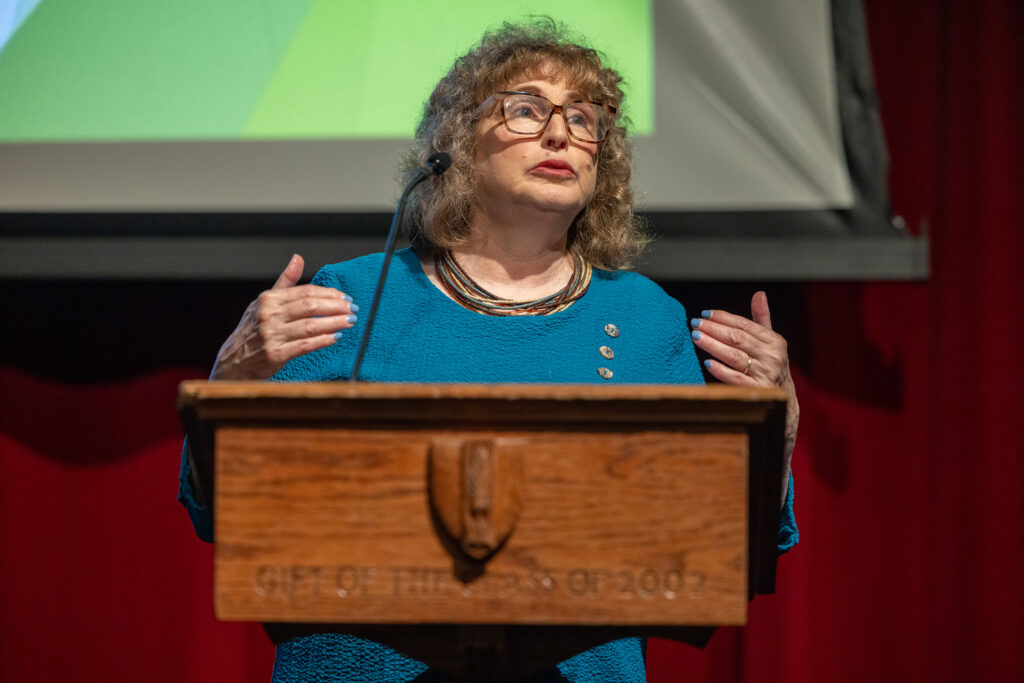Stephanie Pollack on Climate Change, Transportation, and Individual Impact
“Climate change is two words, climate and change,” began Stephanie Pollack in Hall on April 22, Earth Day. “We’re going to talk a little bit about climate, but we’re going to talk a lot about change—specifically the important role that every one of you can play.”
Ms. Pollack most recently served as Senior Advisor to former U.S. Secretary of Transportation Pete Buttigieg. Before that, she was Deputy Administrator of the Federal Highway Administration and Secretary and CEO of the Massachusetts Department of Transportation. She began her talk by explaining the history of Earth Day and how it came to be due to the organization and passion of young people in 1970—her point being that young people, like the boys in Hall that day, have the power and ability to change the trajectory of history.
After providing this context, she discussed the root causes of climate change as it exists today, fifty-five years after the first Earth Day. “Most people are surprised to find out that the biggest source of greenhouse gases in the United States is transportation,” Ms. Pollack stated. “We’ve done a lot of good work in the last ten to twenty years; greenhouse gas emissions from buildings and electric production are going down, but greenhouse gases from transportation are going up.”
In her talk, Ms. Pollack showed current examples of countries successfully lessening the carbon footprint of transportation within their cities. The most prominent example is the Netherlands, one of the most bike-friendly countries in the world and one with an efficient public transportation system. Years ago, the country decided to invest in infrastructure to establish safe and convenient bike routes and frequent rail routes, while also implementing incentives for citizens to use biking or public transportation as primary modes of transportation. Unfortunately, most states and cities in the United States do not make it convenient or possible to use a bike as a primary mode of transportation, and do not have infrastructure in place for convenient and reliable public transportation. Ms. Pollack’s examples of positive change—as in the Netherlands—showed how passion and strength behind an idea can lead to a powerful movement and significant impact.
In closing, Ms. Pollack told the story of Buckminster Fuller, a famed architect who has the words “Call me Trimtab” etched on his gravestone. “If you’re trying to steer a big ocean liner, it has a rudder, but it is so big that no one person can turn it,” Ms. Pollack said. “However, there’s a tiny little thing called a trim tab on the rudder, and moving the trim tab starts a series of events, and then the ocean liner begins to turn. Fuller’s point was that we can find the little things we do by ourselves, with friends, with our community, with or our country, and we become that trim tab. All those trim tabs are moving to turn the giant cruise ship that is our city, country, or planet. Change is not something that other people do. Change is what I do and what you do.”
Ms. Pollack is the latest in an impressive lineup of Hall speakers this year. Further, her talk was supported by a fund established by the Class of 1973 to help address the critical importance of educating young students in solving important world issues and being stewards of the earth. The fund supports the study of environmental sciences at Roxbury Latin, including but not limited to class guests, school speakers, executives in residence, field trips, curriculum resources, conference attendance, conference hosting, and student or guest stipends.

